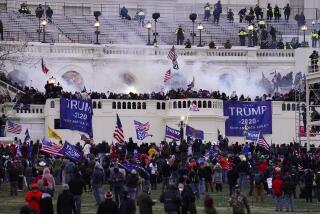Column: We have legal recourse against President Trump. We should use it

On the day after the Trump riot in Washington, the nation’s urgent priority is clear. Our legal and political systems have “in case of fire break glass” tools to try to prevent President Trump from further poisoning the country. It is plainly in the national interest to remove him from the White House and keep him from ever holding office again.
Removal is extreme but exigent. Despite Trump’s tweeted promise on Thursday of an orderly transfer of power on Inauguration Day, for the next two weeks, he is at his most dangerous.
Trump has become his own worst nightmare: a repudiated, ostracized loser. Desperate and feral, the president is a clear and present danger to the national security. The man who once bragged that he had a bigger nuclear button than Kim Jong Un of North Korea should not possess the keys to the nuclear codes (especially with one of his cronies now heading up the Department of Defense) or the ability to invoke the Insurrection Act.
The mob in Washington on Wednesday laid bare the toxic combination of Trump’s megalomania and the obsessions of the far-right, further stoked by the craven ambition of politicians such as Sens. Josh Hawley and Ted Cruz. If Trump’s path to future power were legally cut off, the potential for him to continue to poison our politics would be sharply reduced.
Even before Congress was shut down, respected voices, both Republican and Democrat, had called for a second impeachment of the mad king. As precipitous as that seems, the idea has merit. It would take place as he is already on his way out, but it would assure us that he wouldn’t be able to return to power. Has there ever been as pure and pernicious an abuse of executive power as inciting a mob to storm the Capitol in the service of a total lie?
The House would impeach; then 17 Republican senators would have to join the Democrats to secure a conviction. But even after Wednesday night’s chastened performance from such GOP leaders as Lindsey Graham and Mitch McConnell — whose earlier obdurate refusal to recognize Joe Biden’s election laid the groundwork for Wednesday’s melee — it’s entirely possible that too many Republicans would simply return their heads to the sand.
The 25th Amendment might seem to be well-adapted to the unprecedented problem that Trump presents, but it has limits, and it would not disable him from future office. Section 4 of the amendment permits the vice president and a majority of the Cabinet to declare the president unable to discharge the duties of his office. So far, so plausible in January 2021. But if the president disputed that determination, as Trump surely would, it would fail absent a two-thirds vote of the Senate and the House. It is, in other words a steeper obstacle than impeachment itself.
Turning to the legal system, I have predicted that the Department of Justice will not try to prosecute Trump for his many potential crimes. Prosecution would roil the nation and impede Biden’s agendas. But Wednesday’s grotesque events change that analysis.
Whatever orderly process Trump is now promising, he has for weeks aimed his paranoid fury directly at the peaceful transfer of power, a bedrock of democracy. In response, his followers purposely targeted the physical U.S. government, much like domestic terrorist Timothy McVeigh did when he blew up the Federal Building in Oklahoma City in 1995. Those facts will make it very hard for incoming Atty. Gen. Merrick Garland (who oversaw the Department of Justice’s McVeigh prosecution) to order up a full pass for Trump.
Two main charges would be on the table. Both are in the chapter in the criminal code that addresses “treason, sedition and subversive activities.”
The first is seditious conspiracy, which criminalizes mutual efforts to hinder the execution of federal law or to seize federal property. It is a textbook fit for what happened Wednesday, with one problem: It requires an agreement among conspirators to achieve the unlawful aim. The agreement need not be express; it can be inferred by willful participation in the unlawful plan with intent to further it.
Conspiracy in this case may be challenging to prove, but the behavior of two participants, plus Trump, at the rally that preceded the riot Wednesday might qualify. The president’s lawyer, Rudy Giuliani, elicited cheers with his “let’s have trial by combat” exhortation, and Donald Trump Jr. presaged the day’s events when he called out Congress members willing to count the electoral college votes for Biden: “If you’re going to be the zero and not the hero, we’re coming for you, and we’re going to have a good time doing it.”
In addition to seditious conspiracy, a prosecutor could consider charges based on the neighboring provision that makes it a crime to incite “rebellion or insurrection” against the authority of the United States. These charges don’t involve conspiracy, and they include as a penalty a ban on holding “any office under the United States.”
A rebellion or insurrection charge, in fact, may be the smartest and best bet for federal authorities to pursue. The mob on Wednesday targeted the business of Congress and breached the Capitol. Temporarily, at least, the rioters shut down the constitutional process required to formalize the designation of the president-elect, as good an example as any of a rebellion against the government.
None of this addresses the inevitable prosecution of the rioters themselves. By Thursday morning, the FBI was seeking the public’s help in identifying those who stormed the Capitol, vandalized the Rotunda, went through members’ property and threatened or assaulted law enforcement. Some reports indicated the presence of arms or incendiary devices, which could trigger additional serious charges. And under normal principles of felony-murder liability, some of the rioters may share criminal responsibility for the killing of a rioter, even though the fatal shot reportedly came from law enforcement
President Trump’s conduct, which precipitated a violent frontal assault on our physical and symbolic democracy, cannot be tolerated. He has disqualified himself from participation in our public life. As challenging and tumultuous as some form of forced exile may be, it is the appropriate response to Wednesday’s harrowing events. Trump will never change; the political system and the legal system must contain him.
More to Read
A cure for the common opinion
Get thought-provoking perspectives with our weekly newsletter.
You may occasionally receive promotional content from the Los Angeles Times.










